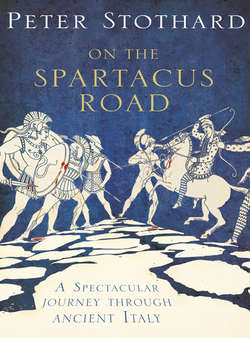Читать книгу On the Spartacus Road: A Spectacular Journey through Ancient Italy - Peter Stothard - Страница 12
Via Appia, Ariccia
ОглавлениеI am trying to stop the car as little as possible before Capua. The old Appian Way sets off like a stone arrow and makes the ancient route as easy as an autostrada. One by one the sites drop away in the rear-view mirror. Pine trees and monuments flash by. The Scipios’ tombs, rock-cut reminders of glories from before Spartacus was born, are a smudge of mural rouge. The memorial to Paezusa, beautician to the court of Nero, is the merest blur. The tower of Caecilia Metella, daughter-in-law of the richest man of the Republic, is a shadow. Far back in the distance is the Quo Vadis church and its marble footprints where St Peter saw his disembodied Christ. Just as ignored are the niches of brick where statues once contemplated the embalming of Priscilla, a former slave whose ‘modesty remained constant as her fortunes rose’. Priscilla and her mourning husband had a good friend in their poet Statius.
The bridge here at Ariccia is a traditional first resting place for travellers hurrying out of Rome. There is a domed church modelled on the Pantheon. There is a palace packed with the blackest paintings from the blood-and-suffering age of the Roman baroque. The surrounding monuments are of Julius Caesar’s family. For a traveller on the Spartacus Road the main attractions are memorials to the Horatii and Curatii brothers, Roman boys and plucky locals who fought a famous triple duel, three-on-three, in the mystic era of the Roman kings.
That ‘Horatii vs Curatii’ affair is the first spectacular of this route, a tiny spark from 250 years before the building of the Appian Way, one of the earliest Italian contests that became more than just a street brawl, a match with some significance and rules, one that meant more than other fights because so many people kept talking about it. No one knows the names of anyone who was there.
Even Livy, Symmachus’ favourite traditionalist, was not certain which side had been Roman and which for the opposition. There were no written records. The Romans later pretended that invading Gauls had burnt the sources of their history; but the words had probably never existed. No one knows if King Tullus of Rome was there or whether he ever was Rome’s king. But for centuries afterwards there were tourists at competing sites who felt that they had seen the fight between the three brothers Horatius and the three brothers Curatius. Their lives were somehow linked to its outcome.
What, more exactly, is a spectacular? From the Latin, spectaculum, say the dictionaries, a show, usually a public show, an attraction for the ‘carnal mind’, an object of public curiosity, contempt or admiration, often of blood but also of song and dance. Or a means of seeing, an opportunity, a front-row seat, a window, a mirror. Or a standard, an example to watchers of an event. Or an example to be passed on to those who have not seen it for themselves, a means of teaching, to angels or to men. Or a sport, a wonder, one of the world’s seven wonders, and then, descending blearily down columns of tiny type, something about phonographs and railway engines, a transparent shield over the eyes of certain snakes.
Spectacular is to spectacle as oracular is to oracle—lavish, amazing, strikingly large, addicted, addicted to spectacle. It is a figure in painted marble up high somewhere, the higher the better, in the oculatissimo, the place with specularity, the place most eyed. It is a play with actors in boots and ballooning togas, declaiming to the sound of flutes, disappearing down trapdoors, rope-walking between columns of red stone while scented water-streams cool and decorate the aisles. Roman politicians long distrusted the theatre; the first building in stone had been dismantled under pressure from the pious while it was still under construction; an edict was passed that one should never be built; but permanent theatre eventually came to Rome.
